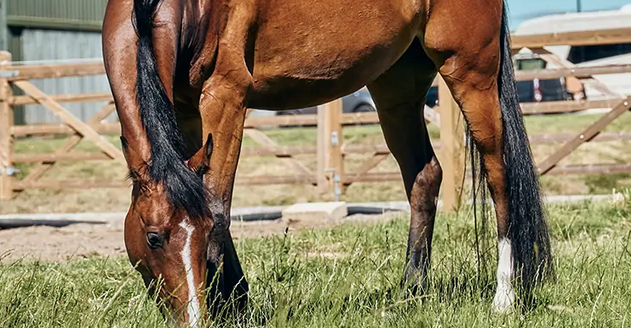|
Getting your Trinity Audio player ready...
|
To ensure your horse enjoys a long and healthy life, providing the right nutrition is paramount. This article delves into the essentials of feeding your horse for optimal health.

Feeding Your Horse for Optimal Health
Understanding the Basics
A horse’s diet plays a pivotal role in maintaining optimal health. The foundation of equine nutrition lies in knowing your horse’s specific needs. Every horse is unique, and factors like age, activity level, and breed influence their dietary requirements.
Balanced Diet for Vitality
A balanced diet for horses consists of three main components: forage, concentrate, and supplements. Forage, such as hay or pasture, forms the core of their nutrition. It provides essential fibre, promoting healthy digestion and preventing colic.
Choose the Right Forage
Selecting the right type of forage is crucial. Avoid mouldy or dusty hay, as it can lead to respiratory problems and other health issues. Ensure a steady supply of fresh, clean water to keep your horse hydrated.
Concentrate Feed
Concentrate feed, like grains or pellets, complements the forage and provides additional nutrients and energy. Consult with a veterinarian or equine nutritionist for precise recommendations.
Supplements
Supplements can fill nutritional gaps in your horse’s diet. However, they should not replace a balanced diet. Common supplements include vitamins, minerals, and omega-3 fatty acids. Be cautious not to over-supplement, as it can lead to imbalances and health issues.
Feeding Schedule
Establishing a regular feeding schedule is vital. Horses thrive on routine, and consistency helps maintain their digestive health. Ideally, horses should be fed small, frequent meals throughout the day to mimic their natural grazing behaviour.
Avoid Overfeeding
Overfeeding is a common mistake that can lead to obesity and related health problems. Obesity can increase the risk of laminitis, insulin resistance, and joint issues. Monitor your horse’s body condition and adjust their diet accordingly.
Optimal Health Considerations
Beyond the basics, several factors contribute to your horse’s optimal health:
1. Dental Care: Regular dental check-ups and floating (smoothing sharp tooth edges) ensure your horse can chew their food properly, aiding digestion.
2. Weight Management: Maintain a healthy body weight through a balanced diet and regular exercise to prevent obesity-related health issues.
3. Parasite Control: Implement an effective deworming program to protect your horse from internal parasites that can compromise their health.
4. Consult Professionals: Seek guidance from equine veterinarians and nutritionists for personalized advice tailored to your horse’s unique needs.
5. Monitor Health: Regularly assess your horse’s overall health, including their coat, weight, and energy levels. Early detection of health issues is crucial for prompt intervention.
Transitioning Your Horse’s Diet
Changes in a horse’s diet should be gradual to avoid digestive upset. Introduce new feeds slowly over several days, allowing their digestive system to adapt.
Variety in Forage
Offering a variety of forages can enrich your horse’s diet. Different types of grasses and hays can provide a broader spectrum of nutrients and prevent boredom during feeding.
Salt Intake
Horses require salt for electrolyte balance and overall health. Providing a salt block or supplement can help meet this need. Ensure it’s always accessible to your horse.
Avoid Feeding Human Food
Never feed your horse-human food or treats like chocolate, which is toxic to them. Stick to equine-specific treats if you wish to reward them.
Senior Horse Care
Senior horses may require special dietary considerations. Consult with a veterinarian to address their changing nutritional needs as they age.
Pregnant and Lactating Mares
Pregnant and lactating mares have increased nutritional requirements to support both themselves and their foals. Adjust their diet accordingly.
Exercise and Nutrition
The amount of exercise your horse gets should influence their diet. Highly active horses may need more calories, while sedentary horses should have a reduced calorie intake to maintain a healthy weight.
Proper Storage
Store feed, hay, and supplements in a cool, dry place to prevent mould growth and preserve their nutritional value. Check for expiration dates on supplements.
Monitor Behavior
Pay attention to your horse’s behaviour around feeding time. Changes in appetite, chewing difficulties, or reluctance to eat can be signs of dental issues or health problems.
Balance Nutrients
Maintaining the right balance of nutrients is essential. For example, too much calcium can interfere with the absorption of other minerals like magnesium.
Grass Quality
If your horse grazes on pasture, monitor the quality of the grass. Lush, rich pastures can cause obesity and increase the risk of laminitis in some horses. Use grazing muzzles if necessary.
Conclusion
Feeding your horse for optimal health is a fundamental responsibility of horse ownership. By understanding their unique dietary requirements and following best practices, you can contribute to their well-being and ensure a long and fulfilling life for your equine companion. Always remember that consulting with professionals in equine health and nutrition is a valuable resource on your journey to providing the best care for your horse.
